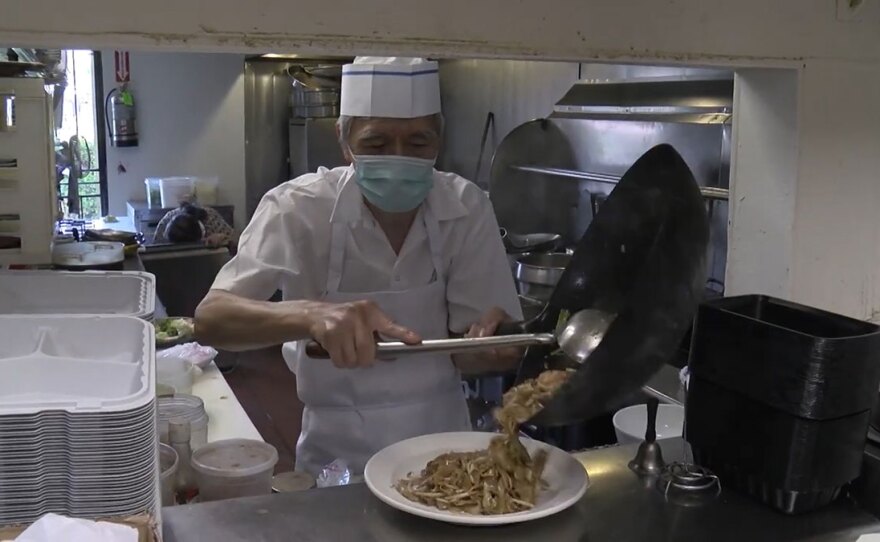California regulators have approved revised worksite pandemic rules that allow fully vaccinated employees the same freedoms as when they are off the job.
The revised regulations adopted Thursday come after weeks of confusion. They conform with general state guidelines by ending most mask rules for people who are vaccinated against the coronavirus.
The governor-appointed California Occupational Safety and Health Standards Board approved them on a 5-1 vote.
Gov. Gavin Newsom planned to quickly issue an executive order sidestepping the usual legal review that would normally keep the rules from taking effect until June 28.
The rules apply in almost every workplace in the state, including to workers in offices, factories and retail.
THIS IS A BREAKING NEWS UPDATE. AP’s earlier story follows below.
California regulators on Thursday were set to approve revised worksite pandemic rules that allow fully vaccinated employees the same freedoms as when they are off the job.
The revised regulations would conform with general state guidelines that took effect Tuesday by ending most mask rules for people who are vaccinated against the coronavirus.
Gov. Gavin Newsom promised on the eve of the meeting that the seven-member, governor-appointed California Occupational Safety and Health Standards Board “will codify that through a vote,” though one board member was absent.
Newsom said he will then quickly issue an executive order sidestepping the usual legal review that would normally keep the rules from taking effect until June 28.
“If there's any ambiguity, if there's concerns around enforcement, we'll clarify that. I have a draft executive order ready to go immediately after they vote to make clarifications public and to provide more certainty,” the governor said.
The rules apply in almost every workplace in the state, including to workers in offices, factories and retail.
They are intended to ensure that workers are protected while businesses resume normal or near normal levels of activity and productivity, Eric Berg, deputy chief of health for California’s Division of Occupational Safety and Health, known as Cal/OSHA, told the board.
But Mitch Steiger, a legislative advocate for the California Labor Federation, AFL-CIO, objected that the measures “essentially pretend that the pandemic is over.”
Loosening the mask rules while a majority of Californians are not fully vaccinated and dangerous variants spread "will sicken many and likely kill some workers” as protections wane, Steiger said, a concern echoed by other union and employee representatives.
The change “moves California in the wrong direction,” said Saskia Kim of the California Nurses Association, urging people to voluntarily remain masked despite the changes.
The move comes after the board did a double-twisting backflip in recent weeks when it first postponed, then rejected, then adopted, then rescinded proposed rules that would have allowed workers to forego masks only if every employee in a room was fully vaccinated against the coronavirus.
The new regulations conform with general state guidelines patterned after the latest U.S. Centers for Disease Control and Prevention recommendations.
Fully vaccinated employees will not need to wear masks, except in locations like mass transit and classrooms where they are required for everyone, or in the event of outbreaks.
Physical distancing will also end except for certain workers during major outbreaks.
Vaccinated employees also won’t need to be tested or quarantined unless they show symptoms, even if they have close contact with an infected person.
Employers must document that workers who skip masks indoors are indeed fully vaccinated. But employers have the choice of requiring workers to show proof of vaccination or allowing employees to self-attest to their vaccination status, with the employer keeping a record of who self-attests.
They could also decide to require everyone to remain masked — vaccinated or not. And vaccinated employees will still be able to wear masks if they choose without facing retaliation.
Rob Lapsley, president of the California Business Roundtable, said the rules don't fully conform to the state's other standards. Others argued that they still will cause confusion.
That's because of the requirement that employers provide masks and keep track of their employees' vaccination status, record-keeping that he and others said could create liability and privacy issues.
"They do remain a significant barrier to fully reopening the economy,” Lapsley said.
Katie Hansen, senior legislative director for the California Restaurant Association, said it is unrealistic to expect unvaccinated employees to remain masked until the emergency work rules expire early next year, while others generally drop their face coverings.
The California Chamber of Commerce took a milder approach, thanking Newsom, a Democrat, for eliminating confusion by pledging to conform workplace rules with the state's loosened pandemic precautions.
That includes immediately ending social distancing obligations instead of waiting until July 31, as Cal/OSHA had initially proposed.
The chamber also praised a rule change that will require employers to provide the most effective N95 masks for free to unvaccinated employees only upon request.
But others objected that the rule still will require employers to stockpile masks and compete with health care workers, despite Newsom's promise to provide a one-month supply of the masks.
There were 700 California workplace outbreaks and more than 10,000 infections in the last 30 days, Cal/OSHA's Berg said, but he said the N95s are the best alternative as other protections wane.
Robert Moutrie, a CalChamber policy advocate, called the latest proposal a “measured step" that opens too quickly for some businesses and not quickly enough for others.
”But we do think that this is a good step in that direction," Moutrie said.






